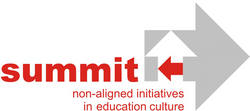Track Program Conference "Summit"

Thursday May 24th
Registration & Information
Venue: WAU – Hallesches Ufer 32
Friday May 25th
11 am CAUCUS: „Organizing the Unorganizable?“
moderation: Valery Alzaga
Venue: HAU 1 Theater hall, Stresemannstrasse 29
Situating “Organizing” within the Summit:
Hae-Lin Choi, Franziska Bruder, Valery Alzaga, Susanne Lang
- decline of: union density, labour & economic rights & the welfare state
- how can unions and social movements respond pro-actively
- what do we want to get from the summit
- why is organizing a focus in the summit
Statements on Organizing:
Let’s rumble!
- Lisa Fithian (30’)- Organizing as a strategy
- ….
Contextualize it, what is it, how does it work, specific example: Immokalee Workers
Trying to Transfer knowledge:
- Franziska Bruder (20’) Union Organizing Attempts and Experiences in Germany
- Leo Penta (20’) Community Organizing Experiences in Germany
translation:
Discussion amongst participants
4.00 pm Working Group: Learning from Organizing: Case Studies
moderation: Susanne Lang
Venue: HAU 3, Tempelhofer Ufer 10
Two examples of Organizing Campaigns that took place in Germany will be analyzed.
What does it take to develop a successful organizing campaign? What are timeframes, resources and possible outcomes of an Organizing Campaign? What has been successful and what not and for which reasons? How could it be improved?
Study 1: Fluechtlingsinitiative Brandenburg: Organizing in Asylumseeker centers in
Brandenburg (2000)
Study 2: LIDL Campaign: Organizing LIDL employees for basic labor rights and
participation, forming workers councils (2006/7)
http://lidl.verdi.de/
translation
Saturday May 26th
11 am Workshop: Working Group: Learning from Organizing: Case Studies
- moderation: Valery Alzaga
Venue: HAU 3, Tempelhofer Ufer 10
Two examples of Organizing Campaigns that took place internationally will be analyzed.
What can we learn? What does it take to develop a successful organizing campaign? Strategy vs tactics? What are timeframes, resources and possible outcomes of an Organizing Campaign? What was successful and what not and for which reasons?
Study 1: Houston Campaign: Organizing Janitors in Houston to form Union and fight for basic labour rights (1 hr, not filmed).
Texas is Bush territory, unions have virtually dissapeared from frontal neo-liberal attacks, anti union laws and national unions not risking a risky fight. Oil, insurance and real estate corporations control this city – the 4th economy in the country. How did migrant workers stood up and won in this inhospitable environment? How did international solidarity support helped?
(2006) – Steven Lerner (Background, Goals & Strategy), Lisa Fithian (specifics on ground work – community organizing and escalation), Zoe Romano (Milan solidarity action and how Houston helped frame key questions for Chainworkers own work) and Hae-Lin Choi (Berlin movement solidarity action, union and social movement working together)
“Dissecting” a campaign and discussing it’s different implications, dynamics, phases, limits, challenges & opportunities. Small to BIG picture.
http://www.houstonjanitors.org/
Study 2: Intermittent: Organizing cultural workers in France to win state funding for temporary unemployment conditions (pending confirmation)
http://www.cip-idf.org/
translation
4.00 pm CAUCUS: "Two or three things we know about precarity“
moderation: Hae-Lin Choi
Venue: HAU 1 Theater hall, Stresemannstrasse 29
Situating this Caucus within the Summit of non-aligned initiatives in education culture:
Stephen Lerner: Background: How to strategize against precarity, what we need to learn & how to rethink strategy.
Bondgenoten (Dutch Cleaners Union): Thougths and experiences from the ground.
Within the new economy industries & neo-liberal privatization/subcontracting trends we work in a growing constellation of precarious conditions (part time jobs, no stable permanent job contracts, isolated/atomized, spread out, declining labour rights, sporadic work, etc.) Paradoxically as labour conditions decrease so do our social rights which in Europe have been ample & guaranteed until now. These trends are developing what is called “precarity” affecting all fields, education, culture, service industries, life itself, etc. This is becoming the norm rather than the exception for many workers in different unorganized industries– here we would like to discuss how do unions and social movements can step up to this challenge, how to think outside of the box, how to organize powerful local and global movements in these conditions.
discussion
translation
Sunday May 27th
continues from Saturday discussion….
11 am CAUCUS: "Two or three things we know about precarity“
moderation: Susanne Lang
Venue: HAU 1 Theater hall, Stresemannstrasse 29
Statements on the Issue of Precarity:
Transferring Knowledge from ongoing Struggles against Precarity:
- Amarela Varela (Barcelona Migrant Organization)
- Zoe Romano (Chainworkers, Milan)
- Bondgenoten (Dutch Cleaning Union)
- Ms Ava Caradonna, (International Union of Sex Workers)
- Jonas Behre (Security, Ver.di)
- Intermittent (France)
Different perspectives from affective and cultural fields, concrete perspectives from the ground work, oganizing experiences, outreach strategies, etc.
discussion
All results will go into the Drafting process.
translation:
4 pm Working Group: Sharing organizing experiences in Labor Unions
Invitation only – Multi-Union organizing meeting
moderation: Franziska Bruder
Venue: HAU 3, Tempelhofer Ufer 10
Sharing of Union organizing experiences and discussion of how we can
make the knowledge that is being developed in our struggles useful to one
another and how can we further develop organizing theory and strategies in and outside of our unions.
Roundtable with speakers from Verdi, NGG, IG Metall, Bondgenoten, among others.
translation:
Supplement: information on the work/ projects
Part of Declaration:
OC: „What’s to be done? – Building an organizing network.“
Constituting a network for the development and advancement of organizing campaigns, methodology and support, building ownership from the ground up.
Organizing Research: declaration
Images:

/




